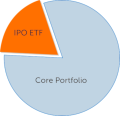
Even after five straight IPO postponements, three of which came last Tuesday, the health of the US IPO market was unclear. Four of the five postponements had come from newly formed or early stage companies, while the previous three completed offerings had done very well, producing an average 16% first-day pop. But Ruckus Wireless' (RKUS) debut on Friday was definitive. The fast growing (85% in the most recent quarter), profitable Wi-Fi system provider fell 18% in the second-worst opening of the year. The drop signaled that macroeconomic weakness and concerns over the fiscal cliff had significantly cooled the US IPO market.
Ruckus Wireless falls after pricing at the high end of the range
Ruckus' performance was disappointing, but also surprising. Pricing at or above the high end of the range, as Ruckus did, is usually a sign of strong demand: Of the 43 IPOs to do so in 2012, only one other produced a negative first-day return (WhiteWave Foods (WWAV), -1%). Prior to Ruckus, just 16% of technology IPOs in 2012 had produced negative first-day returns; all of those priced below the midpoint.
Ruckus' high growth rate (85% in the third quarter) also predicted success. Among the negative first-day technology IPOs, only Vipshop Holdings (VIPS) was growing faster at the time of its IPO. Vipshop, which was burdened by the poor performance of Chinese IPOs in 2011, fell 15% on its first day of trading in March but has since gained 107%, making it the second-best performing technology IPO of the year.
Three IPOs postpone, two of which later withdraw
The three other deals on the calendar last week all postponed their offerings on Tuesday. Energy & Exploration Partners (ENXP), an early stage oil and gas E&P, was seeking to raise $236 million but had yet to generate significant revenue. Radius Health (RDUS), a biotech developing treatments for osteoporosis, had planned to raise $62 million, but its lead product candidate was not expected until 2016. Silvercrest Asset Management Group (SAMG), an $11 billion AUM, long-only investment company for ultra high net worth individuals, was looking to raise $55 million in a difficult environment for long-only active equity managers. Radius Health and Silvercrest officially withdrew their offerings later in the week.
IPO pipeline activity slows
Although zero deals launched last week, one company, Audeo Oncology (AURX), set terms for a $49 million IPO. Audeo's lead product candidate, which aims to enhance the effectiveness of anti-cancer drugs, is in the enrollment stage of a Phase III trial. Leerink Swann and Oppenheimer are the joint bookrunners on the deal.
Boise Cascade (BCC) submitted the only initial IPO filing of the week. The wood products company, which previously attempted to go public in 2005, filed to raise $200 million. In the third quarter, sales increased 22% to $765 million thanks to increased housing starts as the US shows signs of a housing recovery. Chicago-based private equity firm Madison Dearborn is the majority shareholder. BofA Merrill Lynch and Goldman Sachs are the joint bookrunners.
New filers may have to wait until 2013
The pipeline for 2012 IPOs may be fixed at this point, based on new rules under the JOBS Act. Any company filing on Monday (11/19) would have to wait until at least December 10 to launch its roadshow. Even with a relatively short (7-10 day) roadshow, pricing the week before Christmas can make it difficult to garner much investor attention.
The current US IPO pipeline contains 127 companies looking to raise $39 billion. In just the past week, 17 companies, including AutoTrader Group (ATG), updated their filings, suggesting that many may still hope to come public in December despite the weak market.
US IPO performance update
Poor market conditions have had a major impact on recent US IPOs. The average aftermarket return (excluding first-day returns) for IPOs from the past 90 days has fallen to 0%, and the average total return is down to 12%. These figures compare with an 8% average aftermarket return and a 22% average total return as of October 12. Year-to-date numbers are even worse. The 122 US IPOs have produced an average aftermarket return of -2% and an average total return of 11% (compared with 4% and 18% as of October 12).
Global market remains active
While the US IPO market has struggled, the global market has been active. This month, 17 non-US listings, looking to raise a combined $15.9 billion, have been added to the pipeline. Some of the larger listings include Japan Post, Japan's largest deposit holder, French pay-TV channel Canal+, ING Europe (ING US filed on November 9), and Royal Mail, the British postal service.


